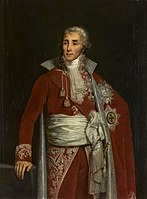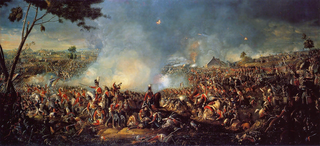
The Battle of Waterloo was fought on Sunday 18 June 1815, near Waterloo, marking the end of the Napoleonic Wars. A French army under the command of Napoleon was defeated by two armies of the Seventh Coalition. One of these was a British-led force with units from the United Kingdom, the Netherlands, Hanover, Brunswick, and Nassau, under the command of the Duke of Wellington. The other comprised three corps of the Prussian army under Field Marshal von Blücher. The battle was known contemporarily as the Battle of Mont Saint-Jean in France or La Belle Alliance in Prussia.

Charles-Maurice de Talleyrand-Périgord, 1st Prince of Benevento, then Prince of Talleyrand, was a French secularized clergyman, statesman and leading diplomat. After studying theology, he became Agent-General of the Clergy in 1780. In 1789, just before the French Revolution, he became Bishop of Autun. He worked at the highest levels of successive French governments, most commonly as foreign minister or in some other diplomatic capacity. His career spanned the regimes of Louis XVI, the years of the French Revolution, Napoleon, Louis XVIII, and Louis Philippe I. Those Talleyrand served often distrusted him but, like Napoleon, found him extremely useful. The name "Talleyrand" has become a byword for crafty, cynical diplomacy.

The Battle of Ligny, in which French troops of the Armée du Nord under the command of Napoleon I defeated part of a Prussian army under Field Marshal Blücher, was fought on 16 June 1815 near Ligny in what is now Belgium. The result was a tactical victory for the French, but the bulk of the Prussian army survived the battle in good order, was reinforced by Prussian troops who had not fought at Ligny, and played a role two days later at the Battle of Waterloo. The Battle of Ligny was the last victory in Napoleon's military career.

The Hundred Days, also known as the War of the Seventh Coalition, marked the period between Napoleon's return from eleven months of exile on the island of Elba to Paris on 20 March 1815 and the second restoration of King Louis XVIII on 8 July 1815. This period saw the War of the Seventh Coalition, and includes the Waterloo Campaign, the Neapolitan War as well as several other minor campaigns. The phrase les Cent Jours was first used by the prefect of Paris, Gaspard, comte de Chabrol, in his speech welcoming the king back to Paris on 8 July.

François-Antoine, Count of the Empire (1756–1826) was a French writer, lawyer and politician during the Revolution and the Empire.

The Waterloo campaign was fought between the French Army of the North and two Seventh Coalition armies, an Anglo-allied army and a Prussian army. Initially the French army was commanded by Napoleon Bonaparte, but he left for Paris after the French defeat at the Battle of Waterloo. Command then rested on Marshals Soult and Grouchy, who were in turn replaced by Marshal Davout, who took command at the request of the French Provisional Government. The Anglo-allied army was commanded by the Duke of Wellington and the Prussian army by Field Marshall Graf von Blücher.

The Battle of Issy was fought on the 2 and 3 July 1815 in and around the village of Issy, a short distance south west of Paris. The result was a victory for Prussian General von Zieten over a French army commanded by General Dominique Vandamme.
Events from the year 1815 in France.
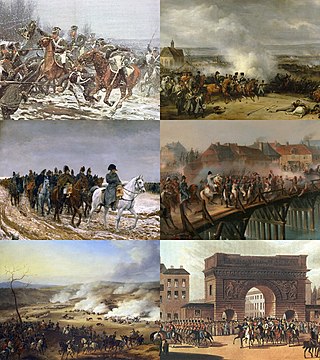
The 1814 campaign in north-east France was Napoleon's final campaign of the War of the Sixth Coalition. Following their victory at Leipzig in 1813, the Austrian, Prussian, Russian, and other German armies of the Sixth Coalition invaded France. Despite the disproportionate forces in favour of the Coalition, Napoleon managed to inflict several defeats, the Six Days' Campaign being the most well-known. However, the campaign ended in total defeat for Napoleon as the Coalition kept advancing towards Paris as Napoleon was out of position to defend the capital, which capitulated in late March 1814. When Napoleon proposed the army march on Paris, his Marshals decided to unanimously overrule Napoleon in order to save the city from further destruction. As a result, the victorious Coalition negotiated the Treaty of Paris, under which Napoleon was exiled to the island of Elba and the borders of France were returned to where they had been in 1792.
Antoine René Charles Mathurin, comte de Laforêt was a senior French diplomat. He was Consul General of France to the United States before the French Revolution. During the First French Empire he was Ambassador in Madrid. He was briefly Minister of Foreign Affairs during the transitional government after the fall of Napoleon in 1814, and in 1815, after second abdication of Napoleon, a plenipotentiary to the Seventh Coalition powers.
Pierre-François Flaugergues (1767–1836) was a French lawyer who took an active part in national politics between January 1813 and September 1816.

The First Cabinet of Napoleon I was appointed by the Emperor Napoleon I upon the establishment of the First French Empire on 18 May 1804, replacing the Cabinet of the Consulate. It was succeeded by the French Provisional Government of 1814 following the downfall of Napoleon and the abolition of the Empire.
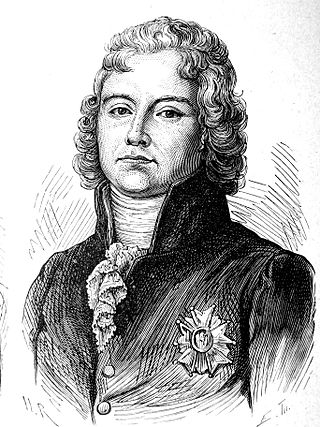
The Ministry of Charles-Maurice de Talleyrand-Périgord was formed on 9 July 1815 after the second Bourbon Restoration under King Louis XVIII of France. It replaced the French Provisional Government of 1815 that had been formed when Napoleon abdicated after the Battle of Waterloo. The cabinet was dissolved on 26 September 1815 and replaced by the First ministry of Armand-Emmanuel du Plessis de Richelieu.

The French Provisional Government of 1814 held office during the transitional period between the defeat of Napoleon followed by the surrender of Paris on 31 March 1814 and the appointment on 13 May 1814 of the Government of the first Bourbon restoration by King Louis XVIII of France.

The French Government of the Hundred Days was formed by Napoleon I upon his resumption of the Imperial throne on 20 March 1815, replacing the government of the first Bourbon restoration which had been formed by King Louis XVIII the previous year. Following the defeat of Napoleon at the Battle of Waterloo and his second abdication on 22 June 1815 the Executive Commission of 1815 was formed as a new government, declaring the Empire abolished for a second time on 26 June.

Claude-Marie Carnot was a French soldier, the brother of Lazare Carnot (1753-1823). He was a deputy to the Legislative Assembly of 1791, a Representative during the Hundred Days of 1815 and a provisional commissioner (minister) in the French Executive Commission of 1815.

Napoleon abdicated on 22 June 1815 in favour of his son Napoleon II. On 24 June the Provisional Government proclaimed the fact to the French nation and the world.
After the defeat of the French Army of the North at the Battle of Waterloo and the subsequent abdication of Napoleon as Emperor of the French, the French Provisional Government repeatedly sent peace emissaries to British commander, the Duke of Wellington, who commanded the Anglo-allied army marching on Paris and others to Prince Blücher who commanded the Prussian army, which was also marching on Paris. The position of the Provisional Government was that now that Napoleon had abdicated and two days later that his son was not recognised by the Provisional Government as his successor, that the casus belli was ended so the Seventh Coalition had no reason to continue its armed invasion of France.
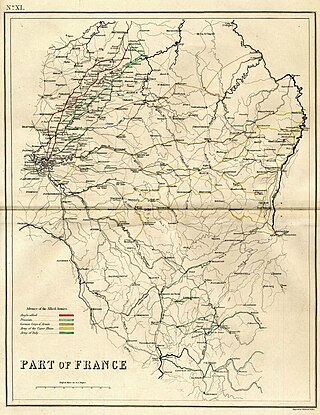
After their defeat at the Battle of Waterloo on 18 June 1815, the French Army of the North, under the command of Napoleon Bonaparte retreated in disarray back towards France. As agreed by the two Seventh Coalition commanders in chief, the Duke of Wellington, commander of the Anglo-allied army, and Prince Blücher, commander of the Prussian army, the French were to be closely pursued by units of the Prussian army.

After the defeat of Napoleon at the Battle of Waterloo and the advance on Paris by the Coalition armies during the months of June and July 1815, although they besieged and took some towns and fortresses as they advanced, they bypassed many of them and detached forces to observe and reduce them. The last of the French fortresses did not capitulate until September of that year.
